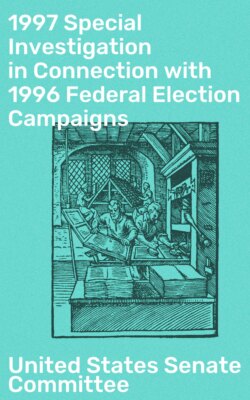Читать книгу 1997 Special Investigation in Connection with 1996 Federal Election Campaigns - United States Senate Committee - Страница 24
На сайте Литреса книга снята с продажи.
The Indian Casino Decision
ОглавлениеTable of Contents
The DNC also targeted the Interior Department’s Bureau of Indian Affairs (“BIA”) to influence a decision whether three bands of Wisconsin Indian tribes would be allowed to open a casino in Hudson, Wisconsin. A wealthy group of neighboring tribes in Minnesota, who operated a nearby casino that would face competition if the Hudson application were approved, opposed the proposal. Significantly, the opposing tribes had given large sums of money to the DNC, while the applicants had not.
After the BIA’s Minneapolis office approved the applicant tribes’ plan in late 1994, the opposing tribes hired Patrick O’Connor, a prominent lobbyist and former DNC treasurer, who spoke personally with President Clinton about this matter. Four days later, O’Connor, accompanied by other lobbyists and opposition tribal leaders, met with Fowler. As one participant recalled it, Fowler “got the message: it’s politics and the Democrats are against [the new casino] and the people for it are Republicans.” Fowler promised that he would contact Ickes and have him talk with Secretary of Interior Bruce Babbitt, which he did a few days later.
After making several calls herself to the Interior Department, Ickes’ assistant Jennifer O’Connor, in June 1995 asked a White House intern to get an update on the Hudson casino. Heather Sibbison, special assistant to Secretary Babbitt, told the intern “it was 95% certain that the application would be turned down.” Just two days later, however, a career BIA employee, wrote a 17-page analysis recommending approval of the Hudson application. Nevertheless, the assurances that Secretary Babbitt’s staff conveyed to Ickes’ office were correct: despite the BIA’s recommendation that it be approved, a draft letter rejecting the application was prepared on June 29, 1995, and the Interior Department formally denied the application on July 14.
The opposing tribes apparently had little doubt as to how to show their gratitude for the Interior Department’s decision to protect them from gaming competition. According to FEC records, in the four months following the Department’s denial of the Hudson application, the opposition tribes contributed $53,000 to the DNC and the DSCC; they donated an additional $230,000 to the DNC and the DSCC during 1996, and gave more than $50,000 in additional money to the Minnesota Democratic Party.
Another suspicious aspect of the Hudson episode involves the inconsistent positions taken by Secretary Babbitt when asked about the matter. According to Paul Eckstein, a longtime friend of Secretary Babbitt who had been retained by the applicant tribes, when Eckstein tried to persuade Secretary Babbitt to delay making a decision on the Hudson matter, Secretary Babbitt replied that Ickes had directed him to issue a decision that very day. Later in their conversation, Eckstein told the Committee, Secretary Babbitt turned the subject to political contributions, declaring to Eckstein: “Do you have any idea how much these Indians, Indians with gaming contracts … have given to Democrats? … [H]alf a million dollars.”
When asked about these comments by Senator John McCain, who then chaired the Senate Committee on Indian Affairs, Secretary Babbitt denied that he had ever told Eckstein anything about Ickes seeking a prompt decision on the Hudson matter. Nevertheless, several months later, in response to this Committee’s inquiry, Secretary Babbitt changed his story, admitting that he probably did make such a remark to Eckstein about Ickes’ request. Secretary Babbitt still claims to have “no recollection” of making the comment Eckstein recalls about the opposing tribes’ political contributions.9
The Hudson casino matter is, if anything, more sordid than the Tamraz story, as political donations to the DNC apparently succeeded in purchasing government policy concessions. In light of the opposing tribes’ DNC contributions, the DNC’s lobbying effort against the casino, the involvement of Ickes’ staff in drawing Secretary Babbitt’s attention to this issue, and Secretary Babbitt’s remarkable comments to Eckstein, the Hudson casino matter raises serious questions about the propriety—and the legality—of the Interior Department’s decision. And the DNC also took advantage of two Oklahoma tribes that sought the return of their former lands, and made contributions in the belief that their prospects for favorable action would be enhanced.
